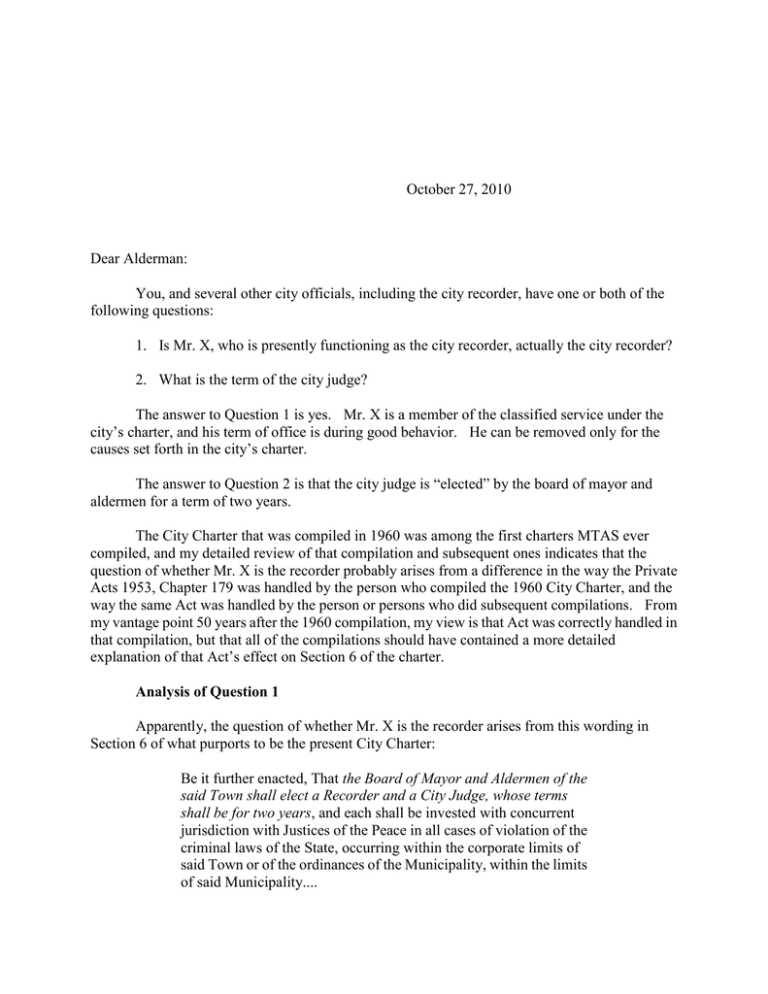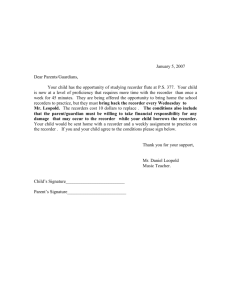October 27, 2010 Dear Alderman:
advertisement

October 27, 2010 Dear Alderman: You, and several other city officials, including the city recorder, have one or both of the following questions: 1. Is Mr. X, who is presently functioning as the city recorder, actually the city recorder? 2. What is the term of the city judge? The answer to Question 1 is yes. Mr. X is a member of the classified service under the city’s charter, and his term of office is during good behavior. He can be removed only for the causes set forth in the city’s charter. The answer to Question 2 is that the city judge is “elected” by the board of mayor and aldermen for a term of two years. The City Charter that was compiled in 1960 was among the first charters MTAS ever compiled, and my detailed review of that compilation and subsequent ones indicates that the question of whether Mr. X is the recorder probably arises from a difference in the way the Private Acts 1953, Chapter 179 was handled by the person who compiled the 1960 City Charter, and the way the same Act was handled by the person or persons who did subsequent compilations. From my vantage point 50 years after the 1960 compilation, my view is that Act was correctly handled in that compilation, but that all of the compilations should have contained a more detailed explanation of that Act’s effect on Section 6 of the charter. Analysis of Question 1 Apparently, the question of whether Mr. X is the recorder arises from this wording in Section 6 of what purports to be the present City Charter: Be it further enacted, That the Board of Mayor and Aldermen of the said Town shall elect a Recorder and a City Judge, whose terms shall be for two years, and each shall be invested with concurrent jurisdiction with Justices of the Peace in all cases of violation of the criminal laws of the State, occurring within the corporate limits of said Town or of the ordinances of the Municipality, within the limits of said Municipality.... October 27, 2010 Page 2 Footnote 1 contained in Section 6 of the present city charter says, “For provisions placing all personnel in the recorder’s office under civil service, see Priv. Acts 1953, ch. 179 as set out in pages 34-45 herein.” The above language contained in Section 6 of the City Charter, is the product of Private Acts 1947, Chapter 154, and would have been an accurate reflection of Section 6 of that charter until Private Acts 1953, Chapter 179 was passed by the Tennessee General Assembly. Private Acts 1953, Chapter 179, amended the City Charter by creating a civil service system for the city. Section 2 of that Act said with respect to the recorder (among other city personnel): The provisions of this Act shall apply to all member personnel working on a paid full-time basis in the Fire Department, Police Department and Recorder’s Office in the Town, including also the Recorder and all personnel in the Recorder’s Office, including jailors, telephone operators, fire alarm superintendent and helper, and the chief of each department. All these persons together shall be known as the classified service. All other employees shall be known as the unclassified service. Section 3, Paragraph 4 of that Act speaks of filling vacancies in the office of recorder, as follows: Provided, however, that should a vacancy occur in the office of Chief of Police, Chief of the Fire Department, or Recorder, said vacancy shall be filled by the governing body of the Town from among all the qualified names on the roster without necessary regard to seniority.... Section 5 of that Act also provides that: All persons holding positions in the Police Department, Fire Department, or Recorder’s Office, including the chiefs thereof upon the effective date of this Act, who shall have served in such position for a period of at least six months previous thereto are hereby inducted into Civil Service in the office, position or employment which such person respectively held at the time of the enactment of this Act subject, however to removal, demotion, or suspension upon the same terms as any other person inducted permanently into Civil Service following the effective date of this Act. October 27, 2010 Page 3 Ordinarily, a city recorder is an officer rather than employee [See Gamblin v. Town of Bruceton, 803 S.W.2d 690 (Tenn. Ct. App. 1990)], but Sections 2, 3 and 5 of Private Acts 1953, Chapter 179 make it clear that persons enveloped by that Act, whether officers or employees, including the recorder, became a part of the classified service. It was recently suggested to me that the term of the recorder could not have been shortened by Public Acts 1953, Chapter 179, because altering the terms of local government officers was prohibited by Article XI, Section 9, of the Tennessee Constitution. That point would have been well taken but for the fact that Article XI, Section 9 of the Tennessee Constitution is the product of amendments to the Tennessee Constitution in November, 1953, which became effective past the date of the passage of Public Acts 1953, Chapter 179. The question at this point is what became of the term of the recorder? Section 7 of Private Acts 1953, Chapter 179, is critical to that question: The tenure of everyone holding office, place, position or employment under the provisions of this Act shall be for and only during good behavior. Specific terms of office stated in Chapter 563 of the Acts of 1903, as amended, or elsewhere are repealed to the extent they do not conform to the present enactment. Any such person may be removed or discharged, suspended without pay, demoted or reduced in rank, or deprived of vacation privileges or other special privileges for any of the following reasons but for no other reasons: **************************************************** [There follows a list of the reasons for which a member of the civil service can be removed for office for cause.] Section 6 of Private Acts 1903, Chapter 563, provided for a term of the recorder, as follows: [T]he Board of Mayor and Aldermen of said town shall elect a Recorder whose term shall be for two years, and who shall be invested with concurrent jurisdiction with Justices of the Peace in all cases of violation of the criminal laws of the State, or of the ordinances of the municipality, within the limits of said municipality.... October 27, 2010 Page 4 Obviously, the term of the recorder found in that Act is identical to the term of the recorder found in Private Acts 1947, Chapter 154, and the language of that part of Section 6 is virtually identical in both Acts. Would it have been better had Section 7 of Private Acts 1953, Chapter 179, expressly provided for what officers’ terms it had repealed? Yes, but in my experience at MTAS with both public and private acts, it was more common years ago than today for the General Assembly to pass legislation that impliedly repealed earlier legislation inconsistent with the current act. Private Acts 1953, Chapter 179, Section 7, strongly implies that the recorder’s term was repealed, as being inconsistent with that Act. It has been repeatedly said by the Tennessee courts that repeals by implication are not favored, but that where the terms of an earlier statute are completely irreconcilable with the provisions of a later statute, the earlier statute is repealed by implication. [See State v. McFarland, 638 S.W.2d 416 (Tenn. Crim.App. 1982), State, Dep’t of Revenue v. Moore, 722 S.W.2d 367 (Tenn. 1986); Brown v. Knox County, 39 S.W.2d 17 (Tenn. Ct. App. 1977).] The recorder’s term of office under Public Acts 1947, Chapter 154 and the repeal of the specific terms of office prescribed by Public Acts 1953, Chapter 179, cannot be reconciled with respect to the recorder’s term of office. For that reason, on that issue, the former must give way to the latter. The 1960 MTAS compilation of the City Charter obviously took that fact into account by changing Section 6 of the charter to read: “Said town shall have a Recorder, to be appointed and serve as set out in Section XXVI, Sub. Sec. 3 hereof....”, and by adding a footnote to Section 6, which informs the reader that, “This section must be considered with Section XXVI, Sub section 3, hereof, as to provisions related to the Recorder, and his assistants since they are covered by Civil Service.” The compiler’s change in Section 6 of the charter and the addition of the footnote to Section 6, accurately reflected the fact that the recorder’s term was no longer two years, and that the recorder was covered by civil service. What was not adequately explained to the reader of Section 6 (including any subsequent reader of that section) was that Section 7 of Private Acts 1953, Chapter 179, had impliedly repealed the term of the recorder. For reasons that I have been unable to uncover, between the time the City Charter was compiled in 1960 and the present date, somebody in MTAS apparently did a review of the City Charter, and reinserted the terms of the recorder (and judge) that appeared in Private Acts 1947, Chapter 154, (and in the city’s original charter found in Private Acts 1903, Chapter 253) In all events–no matter when or why Section 6 of the present City Charter prescribes a two year term for the recorder, and no matter if Section 6 of the 1960 Municipal Code had never taken into account the fact that Private Acts 1953, Chapter 179 had made the recorder a member of the classified service and repealed the term of that office–a review of every private act that makes up the City Charter from the date of its incorporation by Private Acts 1903, Chapter 563, discloses that Private Acts 1953, Chapter 179 has never been amended on those points. October 27, 2010 Page 5 For that reason, two things are clear from that review: - First, since the passage of Private Acts 1953, Chapter 179, as amended, the recorder has been a member of the classified service, and the term of the recorder’s office is for good behavior. -Second, assuming that Mr. X has never been removed from office for the cause or causes contained in Private Acts 1953, Chapter 179, as amended, he is still the recorder of the City. But let us inquire who is the recorder if we assumed that the City Charter provides for a two year term of office for the recorder that the board of mayor and aldermen has never reappointed him to that office, but that the board has allowed him to continue to serve as recorder for 20 or so years. Several Tennessee cases have held that where there is no statutory term prescribed for the municipal officer in question, the term of the municipal officer does not extend past the term of the sitting board. But the same cases stand for the proposition that officers whose terms have expired but who are allowed to continue to serve without reappointment at the beginning of a new term serve as holdovers [See Gambling v. Town of Bruceton, 803 S.W.2d 690 (Tenn. App. 1990); Dingman v. Harvell, 814 S.W.2d 362 (Tenn. App. 1991).] In addition, Article VII, § 5, of the Tennessee Constitution also provides that “Every officer shall hold his office until his successor is elected or appointed, and qualified.” It is said in Jordan v. Knox County, 213 S.W.3d 751 (Tenn. 2007), in which twelve county officers were held disqualified from holding offices because they were serving terms that violated the term limits provision of the Knox County Charter, that: The terms of those public servants who are ineligible for another term, do not, however, end with the filing of this opinion. Pursuant to article VII, section 5 of the Tennessee Constitution, every officer shall hold office until a successor is elected or appointed and qualified. In order to assure the continuous representation of all of the people of Knox County in local government affairs and as a means of preserving, without interruption, the continuation of essential government services, those county commissions and state constitutional officers otherwise precluded from holding the offices to which they were recently elected may continue as defacto officers until their successors are named in accordance with law. [At 784] [Citations omitted by me.] Actually, there appears to be a dispute on the question of whether holdovers are de jure or de factor officers. In Dingman v. Harvell, above, the Court, citing 56 AmJur.2d Municipal October 27, 2010 Page 6 Corporations, § 255 (1971), says: However, in order to avoid the inconvenience to the public which would result if an important municipal office was left without a holder, it is frequently provided by law that the term of the holder of such office shall continue until his successor is appointed and qualified, and holding over pending an election of a successor is as much a part of the term of office as that which precedes it, where a person lawfully continues in office by virtue of his original election and qualification, after the expiration of the statutory period but before his successor is elected ad qualified. The incumbent hold over a de jure officer until his successor is duly elected and qualified. [At 366] But the officers in Dingman v. Harvell, above, and in Gambling v. Town of Bruceton, above, did not hold specific terms of office under the charters under which they were “elected,” and for that reason, their terms expired with the terms of the boards which “elected” them, while the recorder would hold office for a specific term. But it is probably not necessary here to distinguish between those two kinds of appointments to determine whether the recorder is a de jure or defacto officer. In either case, he would be the recorder whose acts are legal. [For the validity of the acts of de factor officers, see County Clubs, Inc. v. City of Knoxville, 395 S.W.2d 789 (1965); Butler v. Cocke County, 671 S.W 847 (Tenn. Ct. App. 1984); Smith v. Landsden, 370 S.W.2d 557 (1963); Inman v. Brock, 622 S.W.2d 36 (Tenn. 1981); Waters v. State ex rel Schmutzer, 583 S.W.2d 756 (Tenn. 1979); Weakley County Municipal Electrical System v. Vick, 309 S.W.2d 792 (1957).] Analysis of Question 2 My review of the Municipal Code reveals no change in the two year term of the city judge that is reflected both in the original City Charter found in Private Acts 1903, Chapter 563, and in Private Acts 1947, Chapter 154. Section 1 of Private Acts 1947, chapter 154, struck out all of Section 6 of the charter (and other sections of the charter that are not pertinent here) and with respect to the terms of the recorder and the city judge, provided that, “[T]he Board of Mayor and Aldermen of said Town shall elect a Recorder and a City Judge whose terms shall be for two years....” Private Acts 1953, Chapter 179, subsequently made the recorder a member of the classified service, but it did not do the same for the city judge. It provided that: The tenure of every one holding office, place, position or employment under the provisions of this Act shall be for and only during good behavior,” Specific terms of office stated in Chapter 563 of the Acts of 1903, as amended, or elsewhere are repealed to the extent that they do not conform to the present enactment. October 27, 2010 Page 7 The “present enactment” did not effect the city judge, and for that reason did not impliedly repeal the term of that office. No private act that amends the City Charter subsequent to Private Acts 1953, Chapter 179 disturbs the term of the city judge. I assume that is the reason the compiler of the City Charter in 1960, changed Section 6 of the charter from the way it read in Private Acts 1947, Chapter 154, to read: Said town shall have a recorder to be appointed and serve as set out in Section XXVI, Sub. Sec. 3, hereof, and a City Judge, elected by the Board of Mayor and Aldermen for a term of two years.... Please let me know if I can help you further in this or any other matter. Sincerely, Sidney D. Hemsley Senior Law Consultant SDH/



